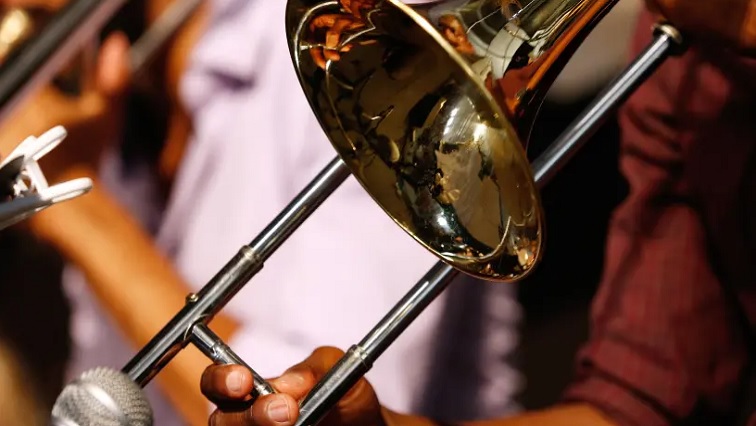Tributes continue to pour in for legendary jazz musician Jonas Gwanga, who died on Saturday. With more than 30 years in the music industry, many are honouring the trombonist for his contribution to the struggle for freedom in South Africa.
Gwagwa is amongst some of the best artists to come out of South Africa.
In 2010, he received the Order of Ikhamanga, which was bestowed on him by former President Jacob Zuma.
Named after the South African indigenous flower which grows in the Eastern Cape, the Order of Ikhamanga is awarded to South Africans who have excelled in fields of art, culture, music, journalism, and sport.
This award is made in three categories. For exceptional achievement, the Order is awarded in gold. It is awarded in silver for excellent achievement, and in bronze for outstanding achievement.
Gwangwa was one of the two recipients of the gold award in 2010 for exceptional achievement, with Hugh Masekela being the other.
The silver award for excellent achievement that year was conferred on Grant Khomo, Ernst Francios Van Dyk, Makana Football Association, Peki Emelia Nothembi Mkhwebane, Percy Tseliso Peter Qoboza and Winston Ntshona.
Life in exile
Gwangwa cut his musical teeth in the 1950s in a group named the Jazz Epistles. The group included some of the country’s biggest stars, trumpeter Hugh Masekela, saxophonist Kippie Moeketsi and pianist Abdullah Ibrahim, drummer Makaya Ntshoko and Johnny Gertze. The group went on to record the Jazz Epistles Verse 1 which included songs such as Dollar’s Moods, Blues for Hughie, Uku-Jonga Phambili and I Remember Billy.
The album was well-received and soon the group was filling up venues in Cape Town. However, this was the time artistic freedom was limited with censorship by the government. African artists were particularly under the government horoscope and the Jazz Epistles posed a threat to the status quo since it drew crowds of people from different races. With tension mounting and the group split.
Gwangwa moved to the United States where he performed at different events, making the world aware of the plight of black South Africans who were discriminated against during the apartheid era. He, along with South African artists including Miriam Makeba, Hugh Masekela, and Letta Mbulu performed at the 1965 Sound of Africa concert.
“We were dancing, doing the gumboots dance and singing,” said Gwagwa during an interview with the SABC.
Being in exile came with its own challenges. However, Gwangwa along with other South African musicians remained committed to the struggle for freedom for their native country.
“It was not easy, but there was a South African community out there and of course, most of them were students and their hang out was at my place. They used to call my place the embassy. When I moved to Atlanta they said why did you move the embassy? But that kept us alive. We would get together and sing, especially with Marriam. Marriam was always singing. Whenever we were together as a group, she would say ‘let’s sing’. That South African community kept the South African spirit going.”
Musician Jonas Gwangwa speaks about anti-apartheid activism while in exile:
His activism through music continued when he moved to Botswana. He became part of the Medu Art Ensemble, a group of anti-apartheid activists including Thami Mnyele, Miles Pelo, and Molefe Pheto.
Medu Art Ensemble produced political posters, distributed photographs of what was happening in South Africa, music capturing the atrocities of apartheid was also composed.
Gwangwa featured heavily in the music composed.
The lyrical content of some of the songs composed is best exemplified in the song Freedom for some, which was released post apartheid.
Freedom bells are ringing
From all corners of the land
Black and white marching hand in hand
Prison walls are shaking
Mandela is not breaking
Freedom now
Freedom now for my people
Nothing can ever stop us now
We are on our way
We will together soon
In South Africa, we will be free
The founder of the group Mnyele is the man behind the African National Congress logo. In 1985, 12 members of the group, including Mnyele, were killed when the South African Defence Force raided Gaborone. The group ceased to exist with some seeking refuge elsewhere.
Angola
At the height of resistance against apartheid in the 1980s, Gwagwa was called to be the artistic director of the African National Congress’ Amandla Cultural Ensemble. The group, which consisted of Umkhonto We Sizwe, ANC’s military wing members, expanded the party’s footprint, lobbying support for the liberation struggle.
The group was also honoured with the Order of Ikhamanga in 2011 and Gwangwa received the award on behalf of the group.
Cry Freedom
The music maestro went on to compose the soundtrack of the movie grammy-nominated movie Cry Freedom which follows the story of anti-apartheid activist Steve Biko and Daily Dispatch newspaper editor, Donald Woods. The nomination scored Gwangwa an opportunity to perform at the ceremony to a standing ovation. He is also the composer behind the soundtrack of the documentary Destructive Engagement.
Jonas Gwangwa remembered:
Unlike some of the unsung heroes, Jonas Gwangwa was recognised for his contribution while he was still alive. The 83-year-old Soweto-born musician continued to produce hits including Kgomo (The wedding song), Batsumi, and Shebeen .
“We say you make music, but music is out there; you just receive and express it. For as long it is still there, we will still be there because it is something that we found in this world. And we will leave it here. It will always stay with us.”


